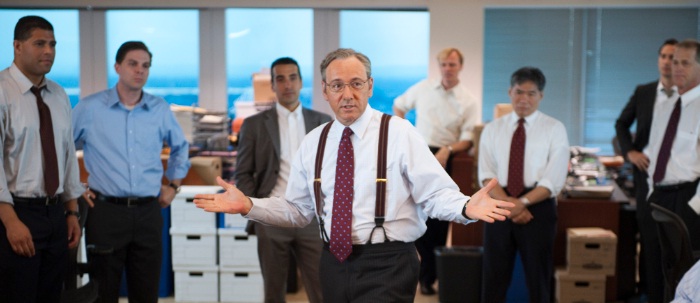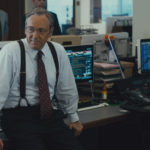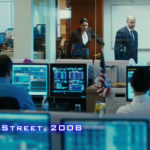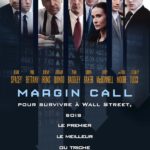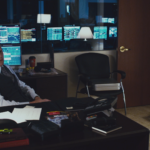“There are three ways to make a living in this business: be first, be smarter, or cheat” – John Tuld (Jeremy Irons), Margin Call
Margin Call is almost Richard III played out in an American Investment Bank in 2008 on the eve of a global crisis. Not unfamiliar turf, perhaps, covered with verve and a degreee of simplification (this being a complex topic) in The Big Short plus a host of documentaries, but never has the process been dealt with as an intimate, almost claustrobic political drama in which the grain of truth calculated by an employee made redundant spells the end of civilisation as these people knew it.
It is a tragedy, to be sure, but more than that – it is how realisation of the truth plays out among the top brass, with the full range of Kübler-Ross stages of grief: denial, anger, bargaining, depression and acceptance. As a film, it works better than you might ever dream possible, for which you cannot ignore the combined talents of a stellar cast, though everything works like dream.
Not bad for a first time writer/director (J C Chandor); in fact, many an experienced director would quale at dealing with an ensemble cast fronted by Kevin Spacey, Jeremy Irons, Demi Moore, Simon Baker, Paul Bettany and Stanley Tucci, quite apart from coaxing splendid performances from each and every actor.
Irons is a veteran, yet he in particular was never better than as John Tuld, CEO and Chairman of the Board, helped by some sparkling lines in Chandor’s script. For example, he asks Zachary Quinto‘s Senior Risk Analyst Peter Sullivan: “Speak to me as you would a 2 year old or a golden retriever.” That line is a thing of beauty!
In fact the golden lines are spread like confetti or trading deals throughout the cast, but I get a strong inference that Chandor allowed each actor leeway, room to breath and work on the finer nuances of their characters without exhibitions of histrionics – which in a parallel universe is how the picture might have ended up. A few more sparkling examples of Chandor’s script are quoted below, but to get the full effect there really is no option but to see the film. My personal favourite is when the chief sees the future and realises it’s time for tough calls:
“I’m here for one reason and one reason alone. I’m here to guess what the music might do a week, a month, a year from now. That’s it. Nothing more. And standing here tonight, I’m afraid that I don’t hear – a – thing. Just… silence.”
Of the performances, nothing but praise is due. The reactions are subtly contained, demonstrating constraint since in this culture it matters how one’s actions are perceived, and, like the court of Richard III, your alliances and enmities mark out whether you will rise to the role of trusted adviser or end up being executed for your pains – of which, more anon.
This company wields the axe at regular intervals, making redundant “3 out of 7” who are good but not quite good enough, then empowering the younger upstarts in their place; truly a young culture, such that reaching 40 you are burned out or promoted beyond your capabilities, as appears to be the case for Baker’s 43 year old but hirsute Jared Cohen.
As Voltaire so admirably put it in Candide, “il faut tuer de temps en temps un admiral pour encourager les autres.” But that’s no consolation for the arbitrarily sacked. One of these blameless victims is Tucci’s Eric Dale, Head of Risk Management, who hands to his lieutenant Sullivan a memory stick with a vague warning to “be careful.”
Sullivan works through the evening while his colleagues are out drinking and uncovers the terrible truth: that the algorithm on which the capital base of the entire organisation is calculated is completely screwed, and even a best case scenario means that a 25% decrease in the toxic asset base will be a loss bigger than the market capitalisation of the company. None of the top brass saw this coming, so at least one head had to roll – in this case Moore’s ineffectual Sarah Robertson, Chief Risk Management Officer. You could see that one coming.
But when it is escalated to the CEO, a man who professes to be in his role earning megabucks not because of brains but because he can hear the music playing 5, 10 or 15 years down the line, his reaction is simple: he cannot hear the music, only silence. So what does he do? A margin call, or as you or I would have put it, a fire sale of all the assets, with massive rewards for those who shift 93% minimum of their bundle.
All the traders know they will almost certainly be on their way out and nobody will ever trust the firm again, but they do what they are asked out of loyalty to the morally compromised Sam Rogers, Head of Sales and Trading, played with remarkable restraint by Spacey. Sam’s dog is dying, which event tells him there are things more important than dodgy financial deals. After 34 years with the firm, he does his duty out of loyalty but then tells Tuld he wants to cash his options and leave – but it’s his life he wants more than the money. Fact is, nothing will ever be the same again.
This is done so well it provokes a full spectrum of opinions. Consider the words of the esteemed Roger Ebert and fellow critics:
Roger Ebert wrote: “I think the movie is about how its characters are concerned only by the welfare of their corporations. There is no larger sense of the public good. Corporations are amoral, and exist to survive and succeed, at whatever human cost. This is what the Occupy Wall Street protesters are angry about: They are not against capitalism, but about Wall Street dishonesty and greed. […] [The cast] reflect the enormity of what is happening: Their company and their lives are being rendered meaningless.”
A.O. Scott wrote: ” Margin Call is a thriller, moving through ambient shadows to the anxious tempo of Nathan Larson’s hushed, anxious score. It is also a horror movie, with disaster lurking like an unseen demon outside the skyscraper windows and behind the computer screens. It is also a workplace comedy of sorts. The crackling, syncopated dialogue and the plot, full of reversals and double crosses, owe an obvious debt to David Mamet’s profane fables of deal-making machismo. Hovering over all of it is the dark romance of capital: the elegance of numbers; the kinkiness of money; the deep, rotten, erotic allure of power.”
But best of all:
The New Yorker film critic David Denby said it was “easily the best Wall Street movie ever made”
A more fitting tribute you can’t imagine – the antidote to Wall Street and “greed is good.”
“So you think we might have put a few people out of business today. That it’s all for naught. You’ve been doing that everyday for almost forty years Sam. And if this is all for naught then so is everything out there [points to the skyline of New York City]. It’s just money; it’s made up. Pieces of paper with pictures on it so we don’t have to kill each other just to get something to eat. It’s not wrong. And it’s certainly no different today than its ever been. 1637, 1797, 1819, 37, 57, 84, 1901, 07, 29, 1937, 1974, 1987 – Jesus, didn’t that fucker fuck me up good – 92, 97, 2000 and whatever we want to call this. It’s all just the same thing over and over; we can’t help ourselves. And you and I can’t control it, or stop it, or even slow it, or even ever-so-slightly alter it. We just react. And we make a lot money if we get it right. And we get left by the side of the road if we get it wrong. And there have always been and there always will be the same percentage of winners and losers, happy fuckers and sad suckers, fat cats and starving dogs in this world. Yeah, there may be more of us today than there’s ever been. But the percentages-they stay exactly the same”
Peter Sullivan: Are you sure it’s the only or the right thing to do?Sam Rogers: For whom?Peter Sullivan: I’m not sure.Sam Rogers: Neither am I.
“Jesus, Seth. Listen, if you really wanna do this with your life you have to believe you’re necessary and you are. People wanna live like this with their cars and big fuckin’ houses they can’t even pay for, then you’re necessary. The only reason they all get to continue living like kings is because we got our fingers on the scales in their favor. I take my hand off and then the whole world gets really fuckin’ fair really fuckin’ quickly and nobody actually wants that. They say they do but they don’t. They want what we have to give them but they also wanna, you know, play innocent and pretend they have no idea where it came from. Well, that’s more hypocrisy than I’m willing to swallow, so fuck ’em. Fuck normal people. You know, the funny thing is, tomorrow if all of this goes tits up they’re gonna crucify us for being too reckless but if we’re wrong, and everything gets back on track? Well then, the same people are gonna laugh till they piss their pants cause we’re gonna all look like the biggest pussies God ever let through the door.”
Seth Bregman: Will? Did you really make two and a half million last year?Will Emerson: Yeah, sure.Peter Sullivan: How did you spend it all?Will Emerson: It goes quite quickly. You know, you learn to spend what’s in your pocket.Peter Sullivan: Two and a half million goes quickly?Will Emerson: All right, let’s see. So the taxman takes half up front, so you’re left with one and a quarter. My mortgage takes another 300 grand. I send 150 home for my parents, you know, keep them going. So what’s that?Peter Sullivan: 800.Will Emerson: All right, 800. Spent 150 on a car. About 75 on restaurants. Probably 50 on clothes. I put 400 away for a rainy day.Seth Bregman: That’s smart.Will Emerson: Yeah, as it turns out, ’cause it looks like the storm’s coming.Peter Sullivan: You still got 125.Will Emerson: Yeah, well, I did spend $76,520 on hookers, booze, and dancers. But mainly hookers.Peter Sullivan: 76.5?Will Emerson: I was a little shocked initially, but then I realized that I could claim most of it back as entertainment. it’s true.
Sam Rogers: The real question is: who are we selling this to?John Tuld: The same people we’ve been selling it to for the last two years, and whoever else would buy it.Sam Rogers: But John, if you do this, you will kill the market for years. It’s over.[John nods grimly]Sam Rogers: And you’re selling something that you know has no value.John Tuld: We are selling to willing buyers at the current fair market price.[Sam lowers his gaze]John Tuld: So that we may survive.Sam Rogers: You would never sell anything to any of those people ever again.John Tuld: I understand.Sam Rogers: Do you?John Tuld: Do you? [pounding on the desk] This is it! I’m telling you this is it!

